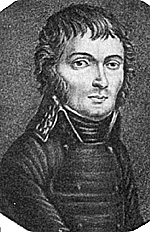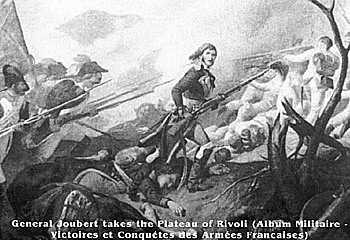
orignally published in Circulair No. 2 1995
This famous commander of the armies of the French Republic was born in Pont-de-Vaux on l4th April 1769. Originally intended to become a lawyer, nevertheless as young as 15 years old, he attempted to join an Artillery Regiment. His father managed to ensure young Joubert was rejected and sent him to Toulon to complete his studies. However, in December 1791, he joined the National Guard as a Sergent in the 3rd Battalion of Ain, which was part of the Army of the Rhine. As early as the following 23rd April, he was promoted to Sous-lieutenant and on 20th August to Lieutenant.
Under General Anselme, he crossed the Var and marched into Italy. With just 30 Grenadiers, he was to defend a redoubt on the Col de Tencle against 500
Austrian and Sardinian troops. The position fell, he was wounded and was taken as a prisoner back to Turin. There, the King of Sardinia asked him, whether he was a noble. His audacious answer - that he was a citizen of France - earned him an awful prison and maltreatment. Later, however, he was released on his parole and back in his home land, he complained about the excesses of the Convention Commissars, Albite, Alban and Vauquois. In order to escape their
wrath, he returned to active duty and in Prairial Year 11 (May 1794), he was appointed a general -adjutant.
In Messidor Year III, he was to attack 6,000 Imperial Austrian troops in a fortified position at Melagno with just 2,000 National Guardsmen. However the attack failed with a loss of nearly 500 men. However, this brave assault brought him promotion to Chef de BatailIon from Kellerman.
Second Frimaire of Year IV saw him appointed Chef de Brigade actually on the battlefield of Loano (see AoN 21) and once again demonstrated his bravery at the battle of Montenotte on 22nd Germinal Year V (11th April 1796). Fighting at Mondovi on 3rd Floreal (12th April), he was hit in the chest, but recovering quickly, he was present at the crossing of the Bridge of Lodi and took command in front of the fortress of Milan. Thereafter he commanded the Advance-Guard of Massena's Corps and was the first to enter Verona.
The Austrian General Wurmser with 30,000 men attacked his troops at Corona on 29th July 1796 and Joubert had to retreat, losing his baggage in the process. The result of this defeat was that the French blockade of the key Austrian fortress of Mantua was briefly raised.
However, some days later, Joubert had the opportunity of taking a glittering revenge at Castiglione on 5th August 1796. Under Bonaparte's command, the Austrians were defeated; Joubert took the village of Solferino and pursued Wurmser as far as Borgetto.
Then he pursued the- enemy and drove on into the Tyrol, where began what Carnot called 'The Campaign of the Giants'. On 29th Ventose, he marched with three Divisions, leading his own and those commanded by Generals d'Hilliers and Dumas, against the Austrian Generals Kerpen and Laudon. Marching through Brixen, he got nearly as far as Innsbruck, fighting seven battles in a period of a month, scattering two enemy army groups and causing them 11,000 casualties, capturing several towns seizing magazines and artillery. By early April, the campaign was over and he assisted in the armistice negotiations, which were finally signed at Leoben on l8th April 1797. So as to let him recover from his wounds and honour him particularly highly, Bonaparte sent him back to Paris with the captured standards.
After a brief period in command of the army in Holland, as well as the one at Mainz, he took over command of the Army of Italy from Brune in Vendemiaire Year VII (September 1798) and set about reorganising it. Then, in just three days without firing a shot, he took Piedmont, capturing 1,800 cannon and 100,000 muskets - as regards his former jailer, King Emanuel of Sardinia, Joubert showed himself magnanimous in victory, for which he was rewarded with some valuable paintings.
When the French Directory, in the face of opposition from the Army commanders, wanted to go step and plunder the occupied territories to enrich themselves, there was considerable unrest among the Generals. The brave Joubert saw the honour of the Army being sullied and resigned. Scherer had to take over command of the Army of Italy, but he was defeated at Magnano and on the Trebbia by Austro-Russian forces, and driven out of Italy. Moreau replaced Scherer, restored order amongst the troops and halted the Allied advance.
Joubert himself had married Madamoiselle de Monthelon, but soon after, feeling duty-bound as a patriotic citizen, rejoined the Army of Italy in Thermidor and offering to help Moreau out. Without hesitation, Joubert crossed the mountains of Montferrat with 20,000 men, in order to join up with the remains of Championnet's Army of Naples and increase the total force to 40,000 men. Facing him were the victorious troops of the Russian General Suvarov and the Austrian General Kray - on 22nd and 30th June, the fortresses of Mantua and Allesandria fell to the Allies, placing the French forces in severe danger. Too late in the day, Joubert decided to withdraw into the gorges of the Appenines.
On 28th Thermidor Year VII, (15th August 1799), Suvarov attacked the French position at Novi with his entire force. In a counter-attack, Joubert was hit below the shoulder and the bullet continued on into his heart. Whether this shot was fired by a Tyrolean Jager is unclear, as
there are various versions of this episode. Although he was dying, Joubert is said to have spurred his men on to advance further.
(Translator's note: Another version, more in line with DupIessi-Bertaux's drawing, is told in Amon Geschichte des kkIR Hoch-Deutschmeister Nr. 4 (1879) p340-1: The Allied right under the Austrian General Paul Kray was ordered to attack the French left in the Pasturana hills during the brightly moonlit night of 14th-1 5th August. Their initial advance prompted Joubert to lead the French reserve forward in a counter-attack: "During the French attack against FML Kray, Korporal Strakate of IR4 noticed a young French General, who had ridden quite close to the skirmish line to reconnoitre his own left wing. Screened by trees and shrubs, Strakate advanced quickly with 11 men towards him, gave the order "Feuer", at which the enemy General, who had just shouted the command "en avant" to his troops, fell from his horse fatally wounded. After the battle, it was discovered that this was General Joubert, who had been shot in the chest by a Deutschmeister soldier and had died a few hours later.")
Moreau took over command of the Army, but that evening, thoroughly defeated, the French had to evacuate the battlefield, having suffering about 16,000 losses, but the wasteful tactics used by Suvarov cost the Allies nearly 25,000 men.
With full military honours, Joubert's body was brought to Toulon and buried in Fort Lamalgue, which was then renamed Fort Joubert. Joubert was a tall and lanky man, giving the appearance of being physically weak, as he bore all the great burdens of the campaigns. Imperturbable, attentive and active, he combined great military talent with being a true citizen of the French Republic, without being eaten up, like so many other Generals, by personal ambition.
Biographie universelle, ancienne et moderne, ou histoire, par ordre alphab6tique, de la vie publique et priv6e de tous les hommes qui se sont fait remarquer par leurs 6crits, leurs actions, leurs talents, leurs vertus ou leurs crimes' 80 vols. (Paris) (1811-1847)
 Following a short period of recuperation, he took over command of Vaubois' Division and was then facing the latest Austrian General, Alvinzi. On the basis of his previous service, he was appointed a General cle Division. Alvinzi attacked with greatly superior numbers on 23rd Nivose (12th January 1797) and Joubert had to abandon his position at Monte Balclo, pulling back on to the Plateau of Rivoli, where he held his lines for 48 hours until Bonaparte came to his aid. Over l4th-15th, the French commanders defeated Alvinzi in the battle of Rivoli. Joubert himself had his horse shot from under him, but musket in hand, he famously led the infantry column assault.
Following a short period of recuperation, he took over command of Vaubois' Division and was then facing the latest Austrian General, Alvinzi. On the basis of his previous service, he was appointed a General cle Division. Alvinzi attacked with greatly superior numbers on 23rd Nivose (12th January 1797) and Joubert had to abandon his position at Monte Balclo, pulling back on to the Plateau of Rivoli, where he held his lines for 48 hours until Bonaparte came to his aid. Over l4th-15th, the French commanders defeated Alvinzi in the battle of Rivoli. Joubert himself had his horse shot from under him, but musket in hand, he famously led the infantry column assault.
Sources
'Nouvelle biographie g6n6rale depuis les temps regul6s jusqu'.~ nos jours, avec les renseignements bibliographiques et l'indication des sources ~ consulter' 46 vols. (Paris) (1852-1866)
G. Six: 'Dictionnaire biographique des genereaux et amiraux franqais de la Revolution et de I'Empire'2 vols. (Paris) (1934)
W. Blos: 'Die Franzisische Revolution' (Berlin, Bonn) (1920)
J. Legrand (Publisher): 'Chronicle of the French Revolution' (London) (1989)
Back to Age of Napoleon 27 Table of Contents
Back to Age of Napoleon List of Issues
Back to MagWeb Master List of Magazines
© Copyright 1998 by Partizan Press.
This article appears in MagWeb (Magazine Web) on the Internet World Wide Web.
Other military history articles and gaming articles are available at http://www.magweb.com